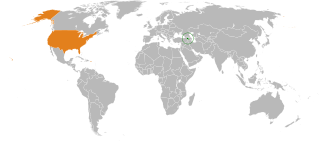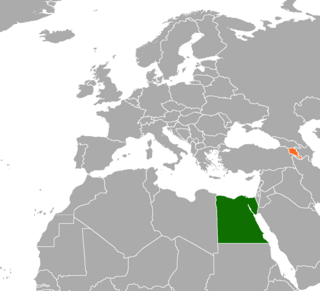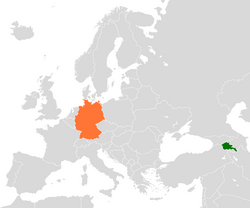
Since its independence, Armenia has maintained a policy of trying to have positive and friendly relations with Iran, Russia, and the West, including the United States and the European Union. It has full membership status in a number of international organizations, such as the Council of Europe and the Eurasian Economic Union, and observer status, etc. in some others. However, the dispute over the Armenian genocide of 1915 and the ongoing Nagorno-Karabakh conflict have created tense relations with two of its immediate neighbors, Azerbaijan and Turkey.

Cem Özdemir is a German politician who currently serves as Federal Minister of Food and Agriculture since 2021. He is a member of the Alliance 90/The Greens party.

Diplomatic relations between Armenia and Turkey are officially non-existent and have historically been hostile. Whilst Turkey recognised Armenia shortly after the latter proclaimed independence in September 1991, the two countries have failed to establish diplomatic relations. In 1993, Turkey reacted to the war in Nagorno-Karabakh by closing its border with Armenia out of support for Azerbaijan.

Bilateral relations exist between Armenia and Greece. Due to the strong political, cultural and religious ties between the two nations, Armenia and Greece today enjoy excellent diplomatic relations. They have always been strong both emotionally and historically due to religious and cultural roots and co-existence during the Byzantine period and under the Ottoman Empire.

A bilateral relationship exists between Armenia and Israel. From 1993 to 2007, Armenia was served by the Embassy of Israel in Georgia. In 1996, Tsolak Momjian was appointed the honorary consul of Armenia in Jerusalem. Eleven years later, the residence of the Embassy of Israel in Armenia was moved to Jerusalem. In October 2010, Shmuel Meirom was appointed the Israeli ambassador to Armenia. Armen Melkonian was appointed the Armenian ambassador to Israel in 2012, with a residence in Cairo. In October of that year, Melkonian presented his credentials to Israeli President Shimon Peres. On 21 September 2019 Armenia announced that it would be opening an embassy in Israel. Despite generally cordial ties between the two, relations soured after Armenia withdrew its ambassador to Israel due to Israeli arms supply to Armenia's enemy, Azerbaijan, in the 2020 Nagorno-Karabakh War.

The dissolution of the Soviet Union in December 1991 brought an end to the Cold War and created an opportunity for establishing bilateral relations between the United States with Armenia and other post-Soviet states as they began a political and economic transformation. The United States recognized the independence of Armenia on 25 December 1991, and opened an embassy in Armenia's capital Yerevan in February 1992.

Foreign relations exist between Armenia and the United Kingdom. The United Kingdom recognised Armenia on 31 December 1991. The first Embassy of Armenia in Europe was established in London in October 1992; in 1995 the United Kingdom established an embassy in Yerevan. The two countries maintain collaborative and friendly relations. Both countries are members of the Council of Europe.

Foreign relations exist between Armenia and Egypt. Egypt was one of the first countries in the Arab world which recognized the independent Armenia in 1991. In March 1992, the diplomatic relations were established between the two countries. In May 1992, the first diplomatic mission of Armenia in the Arab East was inaugurated in Cairo. Egypt has an embassy in Yerevan.

Foreign relations exist between Armenia and Switzerland. Switzerland recognized Armenia as an independent state on 23 December 1991. The two countries have maintained diplomatic relations ever since. The Armenian ambassador to Switzerland and the Swiss ambassador to Armenia were both accredited in 2002. In 2011 the first resident Ambassador of Switzerland started his mission in Yerevan. Both nations are members of the Council of Europe. The Armenian ambassador to Switzerland is based in Geneva, in the Armenian representation to the United Nations. The Geneva Parliament recognized the Armenian genocide in 2001 and the Swiss Federal Parliament recognized the genocide in 2003. While Swiss law made it a crime to deny the Armenian genocide, punishable by a monetary penalty, the European Court of Human Rights ruled in 2015 that a Turkish politician's conviction of the law violated his right to freedom of speech.

Current and historical relations exist between Armenia and Denmark. Armenia has an embassy in Copenhagen, and Denmark is represented in Armenia, through its embassy in Kyiv, Ukraine. Diplomatic relations were established on 14 January 1992. In 2008, the Armenian Foreign Minister Eduard Nalbandyan called the relations between Armenia and Denmark "friendly" and "highly appreciating". In 2013, Amstream was founded as an independent non-political and non-profit organization in order to initiate means of collaboration and partnerships between Armenia and Scandinavia within business, education and culture. Both countries are members of the Council of Europe.

Foreign relations exist between Armenia and Uruguay. Uruguay, as a small South American nations hosts a large Armenian community for its size. The Armenian community in Uruguay totals approximately 16,000 people.

Foreign relations exist between Armenia and China. The first references to Armenian-Chinese contact are found in the works of 5th-century historian Moses of Chorene and 6th-century geographer and mathematician Anania Shirakatsi. The People's Republic of China officially recognized Armenia on December 27, 1991. Diplomatic relations between Armenia and the People's Republic of China were established on April 6, 1992. The Embassy of China to Armenia was established in July 1992, while the Embassy of Armenia to China started its activities on August 10, 1996. The Armenian Ambassador to China resides in the Beijing embassy.

Diplomatic relations exist between Armenia and Mexico. Both nations are members of the United Nations.

The Zurich Protocols refer to two bilateral protocols signed in 2009 by Armenia and Turkey that envisioned starting the process of normalizing relations between the two countries. The Protocols included provisions for the establishment of formal diplomatic relations, the opening of the Turkish-Armenian border, and the establishment of a joint historical commission on the Armenian genocide issue. The agreement, which later proved to be ineffectual, had been brokered by the United States, Russia and France.

Relations between Armenia and Brazil, have existed for decades. The Armenian community in Brazil is the second largest in Latin America totaling approximately 100,000 members.

Armenia–Spain relations are the bilateral relations between Armenia and Spain. The importance of relations centers on the history of Armenians migration to Spain. Approximately 40,000 Armenians and their descendants reside in Spain. Both nations are members of the Council of Europe.

Diplomatic relations exist between Armenia and Chile. There are over 600 Armenians and descendants residing in Chile today. Both nations are members of the United Nations.

Armenia–United Arab Emirates relations are the diplomatic relations between Armenia and the United Arab Emirates. Official relations exist between both nations since 1998. Armenia has an embassy in Abu Dhabi and a consulate in Dubai. The United Arab Emirates has embassy in Yerevan.

Bilateral relations exist between Armenia and Iraq. Armenia has an embassy in Baghdad, and Iraq has an embassy in Yerevan.

Bilateral relations exist between Italy and Armenia. Italy has an embassy in Yerevan and Armenia has an embassy in Rome. Both countries are full members of the Council of Europe.
























